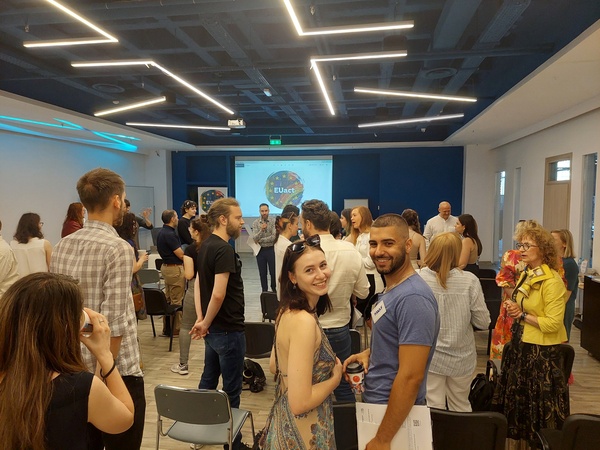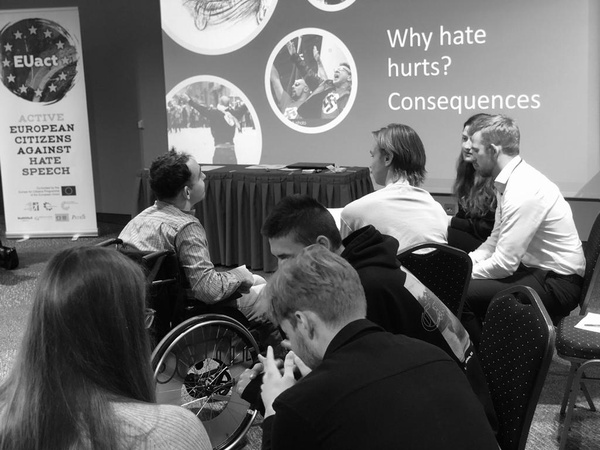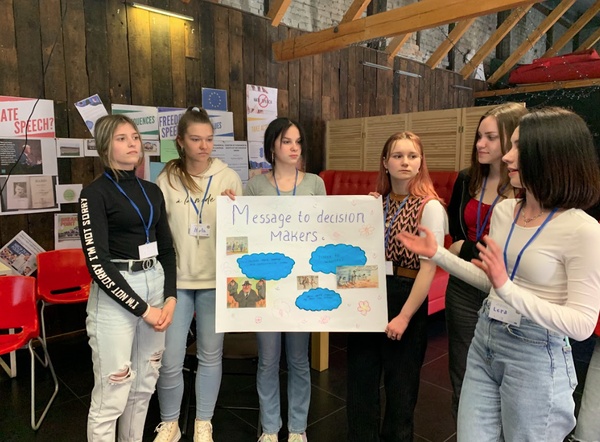Active European Citizens Against Hate Speech - summary of project results
The project «Active European Citizens Against Hate Speech» was funded with the support of the European Union under the Programme "Europe for Citizens"
Preparatory activities: the activities involved 18 participants.
Location / Dates: Riga (Latvia), online
Short description: these activities consisted of regular online meetings of project partner. In total 20 1-2 hours online meetings and one full day kick-off meeting (6 October 2020) were held during the project with participation of all partners. The first preparatory meeting was held on 3 April 2020 and the last one on 5 May 2022. During the meetings partners planned implementation of all project activities, elaborated methodology, shared with their expertise and experience, reported the course of events at the national level.
9 events have been carried out within this project:
Event 1: Research on the impact of hate speech on Euroscepticism and xenophobia
Participation: The event involved 884 citizens, including 137 participants from Latvia, 195 participants from Lithuania, 208 participants from Romania, 88 participants from Bulgaria, 106 participants from Croatia, 150 participants from Estonia.
Location / Dates: The event took place in Latvia, Estonia, Lithuania, Bulgaria, Romania, Croatia, from 1/03/2020 to 31/01/2022
Short description: The aim of the event was to map situation in Latvia, Estonia, Lithuania, Bulgaria, Croatia, Romania on spread of hate speech and its impact on Euroscepticism and xenophobia; collect good practices on how to empower young people to tackle to hate speech, promote European values and civic and political participation; propose recommendations on how EU member states can empower young people and promote their democratic participation. Six national reports “Hate speech and Euroscepticism” and a comparative report “Hate, Euroscepticism, Citizenship: the Youth Connection” were produced. National reports were completed by partner’s experts, while the comparative report was prepared by an academic researcher Anna Krasteva, who prepared also research methodology. All reports are based on desk research, complemented by 36 semi-structured interviews with representatives of NGOs working with youth and vulnerable groups and a survey of 848 young people aged 16-25 on their experiences of hate speech.
This consolidated report introduces a comparative perspective that highlights the general trends as well as the specificities and differences regarding hate, Euroscepticism, and citizenship in two geopolitical regions and six countries, namely three Baltic states – Estonia, Latvia, and Lithuania – and three Balkan states – Bulgaria, Croatia, and Romania. The research ends with recommendations for the EU and its member states on combating hate speech, decreasing Euroscepticism and enhancing civic participation.
Event 2: Experts' meeting
Participation: The event involved 56 citizens, including 20 participants from Latvia, 9 from Lithuania, 9 from Romania, 7 from Croatia, 5 from Bulgaria, 5 from Estonia, and 1 from UK.
Location/Dates: The event took place in Riga, Latvia (online) 5 October 2020.
Short description: The aim of the event to discuss the current situation and challenges concerning hate speech, outline best practices on how to tackle online and offline hate speech, how to empower young people and promote civic participation of migrants and minorities in addressing hate speech and promoting tolerance. The participants represented human rights organisations, NGOs working with vulnerable groups (minorities, migrants, refugees etc.), youth organisations and youth workers, experts, policy makers, and civil activists.
During the first session of the seminar two experts gave keynote speeches about the trends of hate speech and Euroscepticism and far-right populism in Europe. During the second session working groups the participants discussed groups affected by hate speech in their countries, to which factors it is connected, outlined measures needed to be taken to combat hate speech and shared their experience. During the third session, the participants working in two parallel workshops discussed practical approaches in combating hate speech and civil participation of migrants and minorities in prevention of hate speech and promotion of tolerance.
Event 3: local events in Latvia
Participation: The events involved 56 citizens, including 41 participants from Latvia, 6 from Estonia, 2 from Lithuania, 4 from Sweden, 1 from Italy, 1 from Greece, and 1 from the United Kingdom.
Location / Dates: The events took place in Riga on 28 September 2021 and Liepaja on 20 April 2022.
Short description: The aim of the event was to empower young people to stand up against hate speech and promote European values, influencing also existing policies at local and European level. Young people who took part in the events were pupils, students, minorities, immigrants, refugees, persons with disabilities, and other vulnerable groups. There were young people who are active in civic society activities and those who never took part in such events before. Local events outside the capitals and online helped to reached young people from rural areas. Participants of the events discovered the hate speech phenomena, its roots, impact and consequences, debated about the freedom of speech, its role and possible restrictions, discussed important cultural, social, political issues on local and European level related to hate speech, learned about various national and EU initiatives and policies for combating hate speech and how each of us can promote tolerance and human rights. All the local youth events helped to broaden the understanding of emotional burdens hate speech causes to the victims experience. Local events in all the countries promoted a dialogue and peace building between ethnic minorities and the majority of the population, enhancing intercultural understanding of fears and possible problems.
Event 4, local events in Lithuania
Participation: The events involved 61 citizens, including 48 participants from Lithuania, 4 from Latvia, 3 from Germany, 1 from France, 2 from Italy, 2 from Portugal, 1 from Czech Republic.
Location / Dates: The events took place in Vilnius on 10 May and 9 June 2022, in Kaunas on 30 May 2022 and one online on 5 and 6 November 2021.
Short description: The aim of the event was to empower young people to stand up against hate speech and promote European values, influencing also existing policies at local and European level. Young people who took part in the events were pupils, students, minorities, immigrants, refugees, persons with disabilities, and other vulnerable groups. There were young people who are active in civic society activities and those who never took part in such events before. Local events outside the capitals and online helped to reach young people from rural areas. Participants of the events discovered the hate speech phenomena, its roots, impact and consequences, debated about the freedom of speech, its role and possible restrictions, discussed important cultural, social, political issues on local and European level related to hate speech, learned about various national and EU initiatives and policies for combating hate speech and how each of us can promote tolerance and human rights. All the local youth events helped to broaden the understanding of emotional burdens hate speech causes to the victims experience. Local events in all the countries promoted a dialogue and peace building between ethnic minorities and the majority of the population, enhancing intercultural understanding of fears and possible problems.
Event 5, local events in Estonia
Participation: The event involved 51 participants, including 35 participants from Estonia, 7 from Latvia, 2 from Lithuania, 2 from Spain, 1 from Germany, 2 from Slovakia, and 2 from the United Kingdom.
Location / Dates: The events took place in Tallinn on 22 October 2021 and Tartu on 17 June 2022
Short description: The aim of the event was to empower young people to stand up against hate speech and promote European values, influencing also existing policies at local and European level. Young people who took part in the events were pupils, students, minorities, immigrants, refugees, persons with disabilities, and other vulnerable groups. There were young people who are active in civic society activities and those who never took part in such events before. Local events outside the capitals and online helped to reached young people from rural areas. Participants of the events discovered the hate speech phenomena, its roots, impact and consequences, debated about the freedom of speech, its role and possible restrictions, discussed important cultural, social, political issues on local and European level related to hate speech, learned about various national and EU initiatives and policies for combating hate speech and how each of us can promote tolerance and human rights. All the local youth events helped to broaden the understanding of emotional burdens hate speech causes to the victims experience. Local events in all the countries promoted a dialogue and peace building between ethnic minorities and the majority of the population, enhancing intercultural understanding of fears and possible problems.
Event 6, local events in Bulgaria
Participation: The events involved 83 participants, including 69 participants from Bulgaria, 1 from Sweden, 1 from Portugal, 1 from Italy, 1 from Romania, 1 from Belgium, 1 from Spain, 1 from Slovenia, 5 from Ukraine, 1 from Turkey, 1 from Tunisia.
Location / Dates: The events took place in Sofia on 9 April and 17 May 2022, in Veliko Tarnovo on 15 May 2022, and online on 10 and 12 May.
Short description: The aim of the event was to empower young people to stand up against hate speech and promote European values, influencing also existing policies at local and European level. Young people who took part in the events were pupils, students, minorities, immigrants, refugees, persons with disabilities, and other vulnerable groups. There were young people who are active in civic society activities and those who never took part in such events before. Local events outside the capitals and online helped to reached young people from rural areas. Participants of the events discovered the hate speech phenomena, its roots, impact and consequences, debated about the freedom of speech, its role and possible restrictions, discussed important cultural, social, political issues on local and European level related to hate speech, learned about various national and EU initiatives and policies for combating hate speech and how each of us can promote tolerance and human rights. All the local youth events helped to broaden the understanding of emotional burdens hate speech causes to the victims experience. Local events in all the countries promoted a dialogue and peace building between ethnic minorities and the majority of the population, enhancing intercultural understanding of fears and possible problems.
Event 7, local events in Romania
Participation: The events involved 53 participants took part in the events, including 46 participants from Romania, 3 from Poland, 1 from France, 1 from Italy, 1 from Moldova, and 1 from Albania.
Location / Dates: The events took place in Cluj-Napoca on 7 May 2022, in Bucharest on 14 May 2022 and online on 13 November 2021.
Short description: The aim of the event was to empower young people to stand up against hate speech and promote European values, influencing also existing policies at local and European level. Young people who took part in the events were pupils, students, minorities, immigrants, refugees, persons with disabilities, and other vulnerable groups. There were young people who are active in civic society activities and those who never took part in such events before. Local events outside the capitals and online helped to reached young people from rural areas. Participants of the events discovered the hate speech phenomena, its roots, impact and consequences, debated about the freedom of speech, its role and possible restrictions, discussed important cultural, social, political issues on local and European level related to hate speech, learned about various national and EU initiatives and policies for combating hate speech and how each of us can promote tolerance and human rights. All the local youth events helped to broaden the understanding of emotional burdens hate speech causes to the victims experience. Local events in all the countries promoted a dialogue and peace building between ethnic minorities and the majority of the population, enhancing intercultural understanding of fears and possible problems.
Event 8, local events in Croatia
Participation: The events involved 51 participants took part in the events, including 42 participants from Croatia, 1 from Germany, 1 from Austria, 4 from Serbia, 1 from Bosnia and Herzegovina, 1 from United Kingdom, 1 from Norway.
Location / Dates: The events took place in Zagreb on 3 June 2022 and Rijeka on 10 June 2022.
Short description: The aim of the event was to empower young people to stand up against hate speech and promote European values, influencing also existing policies at local and European level. Young people who took part in the events were pupils, students, minorities, immigrants, refugees, persons with disabilities, and other vulnerable groups. There were young people who are active in civic society activities and those who never took part in such events before. Local events outside the capitals and online helped to reached young people from rural areas. Participants of the events discovered the hate speech phenomena, its roots, impact and consequences, debated about the freedom of speech, its role and possible restrictions, discussed important cultural, social, political issues on local and European level related to hate speech, learned about various national and EU initiatives and policies for combating hate speech and how each of us can promote tolerance and human rights. All the local youth events helped to broaden the understanding of emotional burdens hate speech causes to the victims experience. Local events in all the countries promoted a dialogue and peace building between ethnic minorities and the majority of the population, enhancing intercultural understanding of fears and possible problems.
Event 9, Final international conference “Tackling the Impact of Hate Speech on Our Lives and Society: A Comprehensive Approach Towards Prevention of Hate Involving Policy Makers and Young People”
Participation: The event involved 54 participants, including 38 participants from Romania, 3 from Bulgaria, 2 from Croatia, 3 from Latvia, 2 from Estonia, 2 from Lithuania, 1 from Germany, 1 from United Kingdom, 1 from Moldova, 1 from Portugal.
Location / Dates: The event took place in Cluj-Napoca, Romania, on 25 June 2022.
Short description: The aim of the event was to disseminate outcomes of project local events, present research results and recommendations, promote discussion on further challenges that need to be addressed on the EU level, raise awareness of the young people and general public about the related issues. The participants represented a diverse group – educational professionals, NGOs, students, representatives of minorities and vulnerable groups, young people and other persons interested in taking more active role in promotion of human rights and tackling intolerance.
During the conference overview about the project activities and main conclusions were presented, including detailed presentation about the findings and recommendations of a comparative report and the outcomes of local youth events sharing youth messages on tackling hate speech all over Europe. The speakers of the conference stressed actual developments regarding hate speech, outlined the current challenges within the EU, newest initiatives of the European Commission on tackling hate speech, and the importance of joined-up approach, outlined the changes in the landscape of hate speech, specifically focusing on Romanian context. The conference included interactive workshops discussing actual topics aiming to promote exchange of practices and ideas for further initiatives on combating hate speech and promoting democratic values. One of the workshops was dedicated to the topic of a comprehensive approach addressing and overcoming hate and sharing experiences from the EU and globally and discussing hate speech and freedom of speech: limits, challenges, solutions. The conference ended with conclusion from the workshops and discussion on the further steps to make preventing hate speech.
Project in 3 pictures:



Attachments
Published: 2022-09-08
